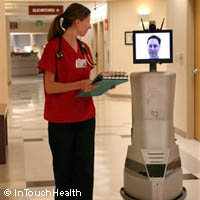European scientists to develop robot nurses
Swarms of intelligent robots that can clean, tidy and even attend to patients remotely could soon find their way into hospitals. The EU funded project IWARD is looking to develop three robot nurses that could perform a range of tasks for nurses, such as checking temperatures and blood pressure and generally easing the burden on hospital staff so they can spend more time with patients. The robotic nurses could also help to keep wards cleaner and cut infections by hospital super bugs such as Methicillin Resistant Staphylococcus Aureus (MRSA). Each 'nursebot' will consist of a basic platform mounted with a module of sensors and equipment for different tasks. So for example, a robot could be fitted with a laser thermometer to measure body heat from a distance or cleaning equipment to mop up spills. Another task could be to guide visitors around the hospital. While the hardware and modules will use off-the-shelf technology, the swarm-based intelligence will require groundbreaking work, as will the software platform to allow the robots to operate semi-autonomously. 'The idea is not only to have mobile robots but also a full system of integrated information terminals and guide-lights, so the hospital is full of interaction and intelligence,' said Thomas Schlegel, the project leader from the Fraunhofer Institute. 'Operating as a completely decentralised network means that the robots can co-ordinate things between themselves, such as deciding which one would be best equipped to deal with a spillage or to transport medicine,' he continued. Each robot would be fitted with a suite of sensors, allowing it to move around the hospital, using proximity sensors to avoid collisions and inbuilt cameras to explore its environment. One robot would be able to warn another if its cameras see a collision. Information could be communicated between the robots by using either a wireless Local Area Network (LAN) or Bluetooth technology or even infrared lasers. The robots could then communicate with patients and pass messages on to staff. Dr Schlegel said: 'IWARD will mean that hospital staff will be able to spend more time with their patients rather than doing other basic tasks.' The project began this month and the team hopes to have developed a three-robot prototype system by 2010.



